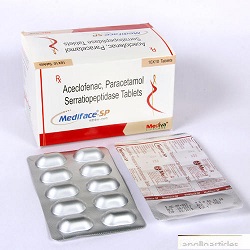Where to Buy Aceclofenac (Hifenac) Canada?
Description
Aceclofenac is one of the class of substances known as non-steroidal anti-inflammatory drugs (NSAIDs). The most common use of aceclofenac is as a pain relieving drug. In this role, aceclofenac is used to treat inflammation and pain resulting from conditions such as ankylosing spondylitis, osteoarthritis, and rheumatoid arthritis. Aceclofenac is generally dispensed in the form of tablets coated with a thin layer of film, and it is often also known by brand names, for example Preservex.
The way that aceclofenac works is by fighting against cyclo-oxygenase in the body. This substance, which is often abbreviated to COX, plays a part in the generation of chemicals which cause irritation - and thereby pain - in sufferers of arthritis and some similar conditions. The presence of aceclofenac in the body works to stop COX from producing those chemicals. Aceclofenac therefore blocks the actions which can lead to the pain and inflammation which cause such distress to sufferers of such conditions.
Recommendations

Tablets of aceclofenac should be administered orally, to be swallowed along with a glass of water. Ideally, they should be taken either at the same time as, or just after, food, since taking the aceclofenac while fasting can affect the rate at which it is absorbed. As with most drugs, the amount of aceclofenac used should be as low as possible, and for as short a time as possible, while still succeeding in controlling the symptoms - pain and inflammation - for which aceclofenac is intended to provide relief.
It is recommended that aceclofenac is taken in a dosage of 200 mg per day. This should be split into two doses of 100 mg each, one to be taken early in the day and one to be taken in the evening. Aceclofenac should not be administered to people younger than 18 years old, since there is insufficient clinical research into aceclofenac's effect on children. At the other end of the scale, it must be remembered that the elderly patients for whom aceclofenac can be most effective are also at increased risk of suffering side effects. However, the dosage administered should be the same as for other adults.
Patients who have impaired kidney function need to be treated very carefully when aceclofenac is being administered. Although for those with milder conditions, the recommended dosage of aceclofenac remains as above, people who have more severe impairment may require some modification to their treatment regime. In any case, the use of any NSAIDs, including aceclofenac, must be considered and monitored with particular care when it comes to patients who have any renal problems.
Patients with impaired liver function constitute the main special case where aceclofenac is concerned, in that this class of patients does seem to benefit from a reduced dose of the drug. Although research into this subject is incomplete and ongoing, what evidence does exist points toward the use of a halved dosage of aceclofenac for those with deficient hepatic function. In other words, 100 mg of aceclofenac per day instead of the 200 mg recommended for most other classes of patient.
Side Effects
Although side effects from taking aceclofenac are quite rare, some of them are potentially very serious, or even life threatening, so it is of great importance to understand that they cover a wide variety of categories. Aceclofenac can cause a range of gastrointestinal problems, ranging from mild stomach upsets, through diarrhea and vomiting, to very serious conditions such as pancreatitis. In certain cases, the use of aceclofenac can also cause stomach ulcers.
Other side effects of aceclofenac include anaphylactic reactions and similar immune system problems, blood conditionms such as anemia and reduced platelet count, and a number of skin conditions including hives. Aceclofenac has also been found to provoke liver disorders like jaundice and hepatitis on rare occasions. Other complications, such as depression, insomnia, abdominal pains or cramping, and unexpected weight gain, can also be brought on by the use of aceclofenac in some patients.
Restrictions
In the United Kingdom, aceclofenac is regulated as a prescription drug, and cannot be purchased over the counter, even in a pharmacy. The drug is not generally available within the United States, although aceclofenac is produced - under the brand name Clanza CR - by United Douglas Pharm., Inc., for export purposes only. The similar but older drug, naproxen, is commonly prescribed in the U.S. for the treatment of the conditions for which aceclofenac might be used.

